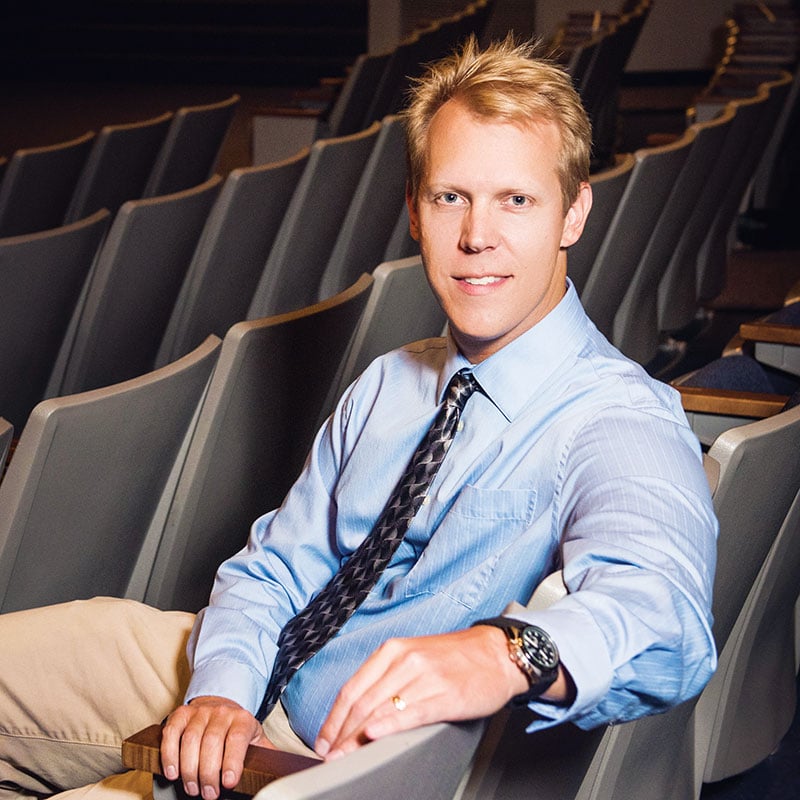Staging Your Business to Succeed
Actor Uses Theater Training and Techniques to Improve On-the-Job Performance


Jason Hedden is paid to help some of the area’s finest businessmen and women act out on the job.
Recently named chair of Visual and Performing Arts at Gulf Coast State College (GCSC) in Panama City Beach, the 38-year-old Hedden also is an actor, playwright, director and associate professor. He holds a Master of Fine Arts degree in acting and devised theater from Ohio State University and undergraduate theater degrees from the University of South Florida and GCSC.
Before he began teaching, Hedden appeared on stage at Seattle Shakespeare Company and Book-It Repertory Theatre in Seattle and at Theatre Northwest in Washington. Originally from Portsmouth, Virginia, Hedden lived in the Emerald Coast area in the 1990s and returned in 2008 to settle in Panama City Beach with his wife, Rebecca, and their now 6-year-old son, Cameron.
In 2012, he became a founding board member of Emerald Coast Theatre Company (ECTC), a nonprofit theater founded in Miramar Beach by Anna and Nathanael Fisher. In addition to appearing in productions of “Art” and “Resurrecting van Gogh” — an original work created and written by Hedden — he offers a customized corporate training program as a fundraiser for ECTC.
Since he began offering corporate training about five years ago, he has worked with real estate companies, retail owners and universities to improve their skills by what he describes as “rehearsal for reality” with secret shopping (actors pose as shoppers so retailers can gauge their customer service experience), theater games and lifelike role-playing scenarios with local actors.
We caught up with the fair-haired performing professor in between classes to chat about using play-acting to help business professionals be the best in their starring roles — as themselves.
EC: You refer to the corporate training program as applied theater. Can you explain what it is?
JH: Applied theater is a new catch-all buzzword. There are four or five colleges in the country offering degrees in it now. Basically, it’s every type of theater except the most common type. In applied theater, the participants are the beneficiaries versus an audience.
EC: How does the corporate training program you offer help?
JH: We teach theater techniques to help people more effectively communicate in a spontaneous manner. We customize our program to fit the needs of a particular business. Some want to improve public speaking skills; others want to use it for team building, secret shopping and some want to increase their interpersonal communication skills in order to close a deal.
EC: What does engaging trained actors bring to local businesses?
JH: Our actors have portrayed sick patients for medical students and done improv about domestic disputes to give officers in training the opportunity to rehearse conflict negotiation in a safe environment and get feedback from their instructors. They have posed as buyers and sellers for real estate agents. The actors stay in character. There is no timeout. The Realtors cannot help each other, and so they cannot “cheat” in a sense. They get to practice their sales pitch when money is not on the line. The participants realize it’s not a game and it becomes real, so the level of training is enhanced immediately.
EC: What are the most common things you notice in the business clients you work with?
JH: When they are able to observe themselves, most often they will see they are talking too fast or that they are not listening to what people are saying to them.
EC: As a student of applied theater and a creative professional, you seem comfortable with unconventional approaches to solving problems.
JH: Right. As an actor you may have hundreds auditioning for every role. I worked in New York City, so I went in the back door. I was knocking on the door of Art Therapy for Cancer Patients when I was staging “Resurrecting van Gogh.” I tell my students to consider non-traditional avenues for your art. I’ve started to do that for other projects as well, such as the corporate training.
EC: As a theater professor, what advice do you commonly give?
JH: That all of your interactions have to be authentic. One of the things I tell my students, which I stole from my favorite acting teacher, Richard Robichaux, is to say, “Really do what you’re really doing for real, really.” If you are on stage and you are trying to remember your lines, that’s what we see. If what you’re doing is you are trying to convince your partner to not leave you, we will be engaged and riveted. People are overacting not when they are really performing an action, but when they are pretending to write or to read a letter.
EC: What has a career in theater given you?
JH: The gift of presence, meaning being in the present moment. Everything that makes me a better actor makes me a better human being. It builds empathy, and I think that is invaluable. I’ve been able to travel and have friends all over the world. And for six weeks at a time, I get to live in that moment in someone else’s shoes and be an expert at something.


